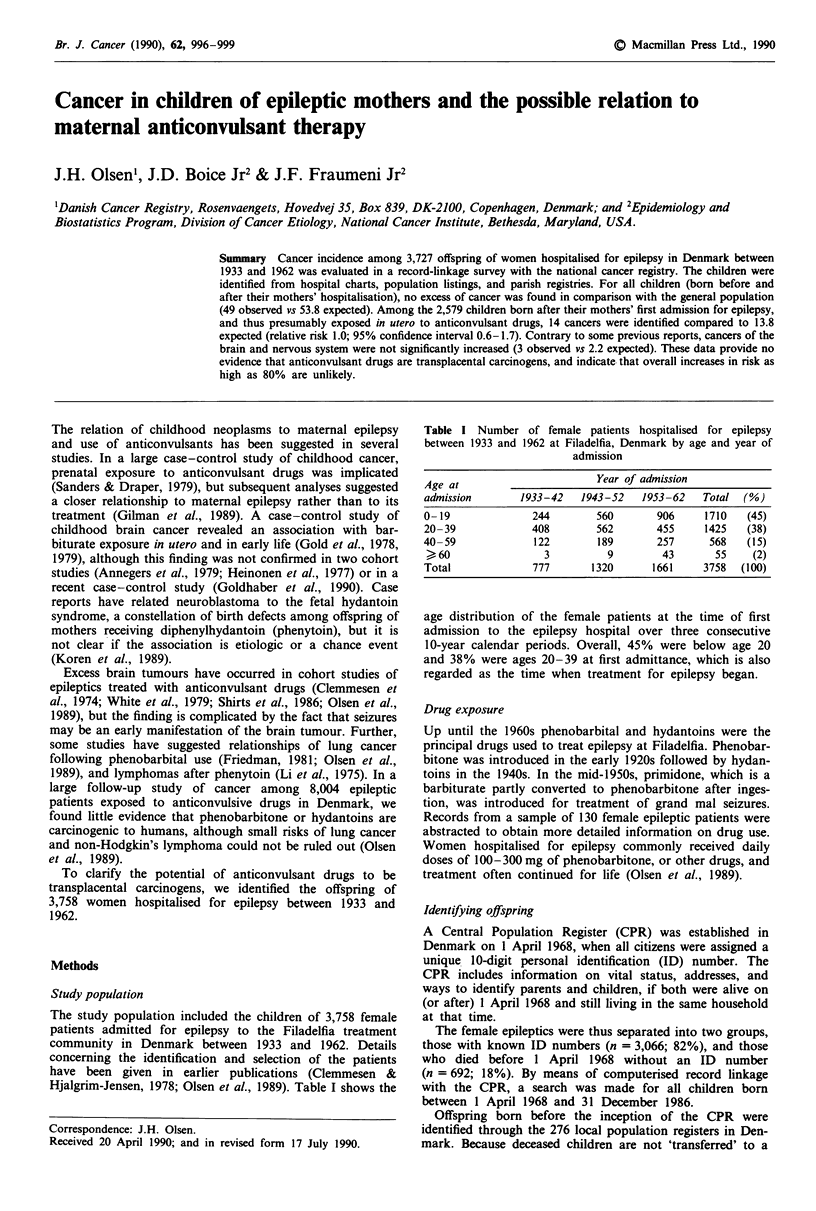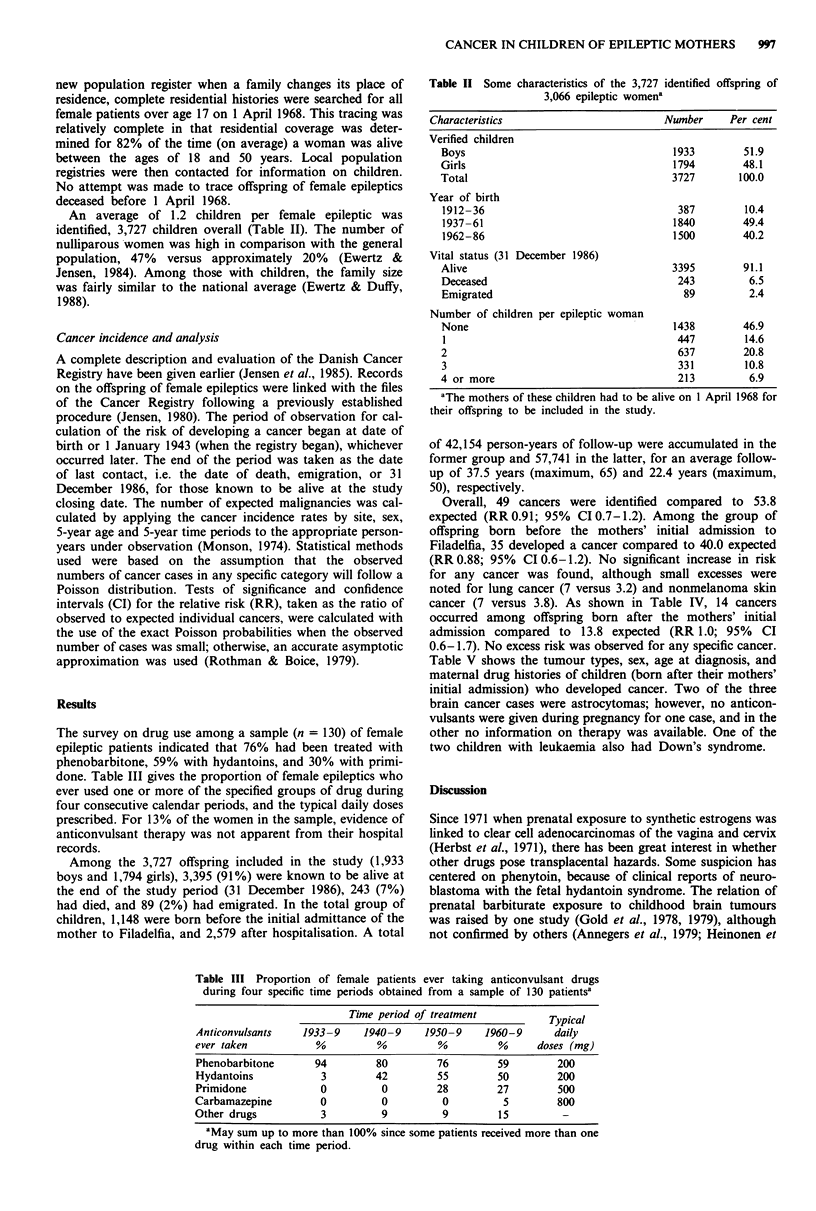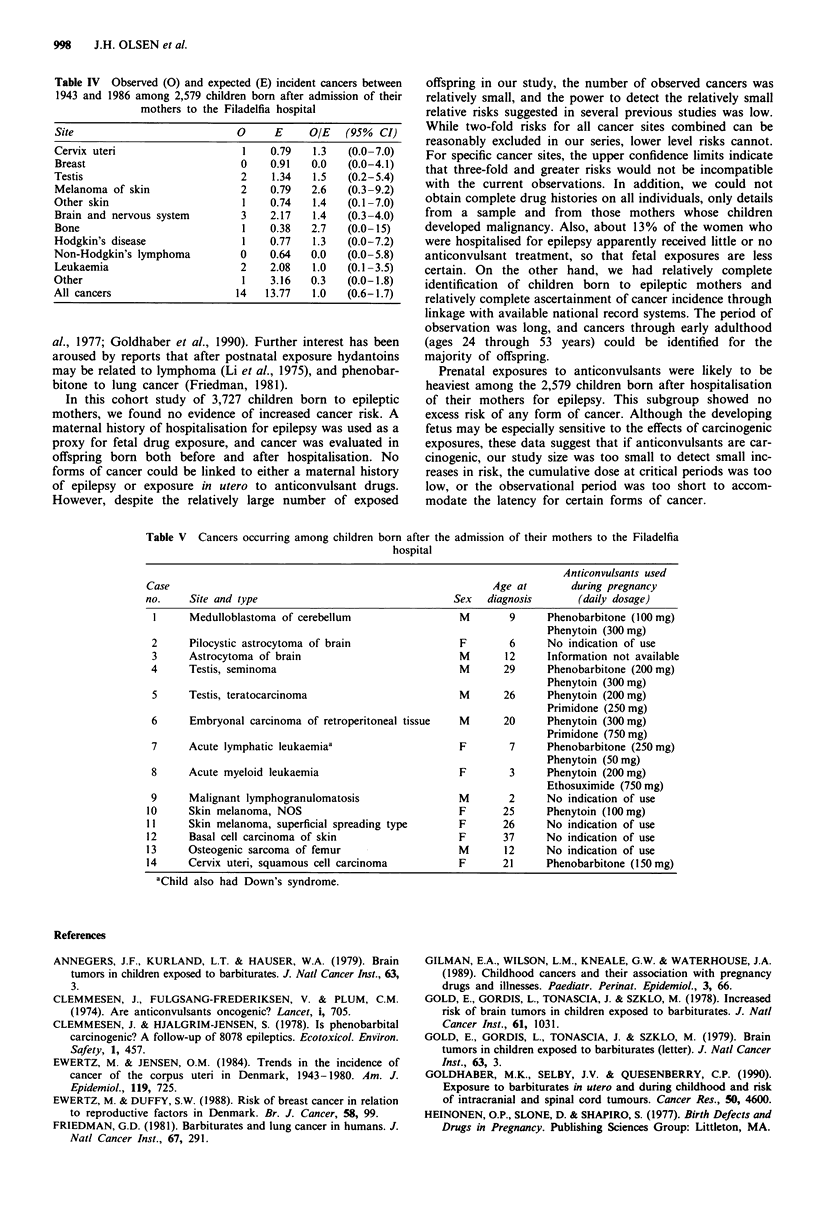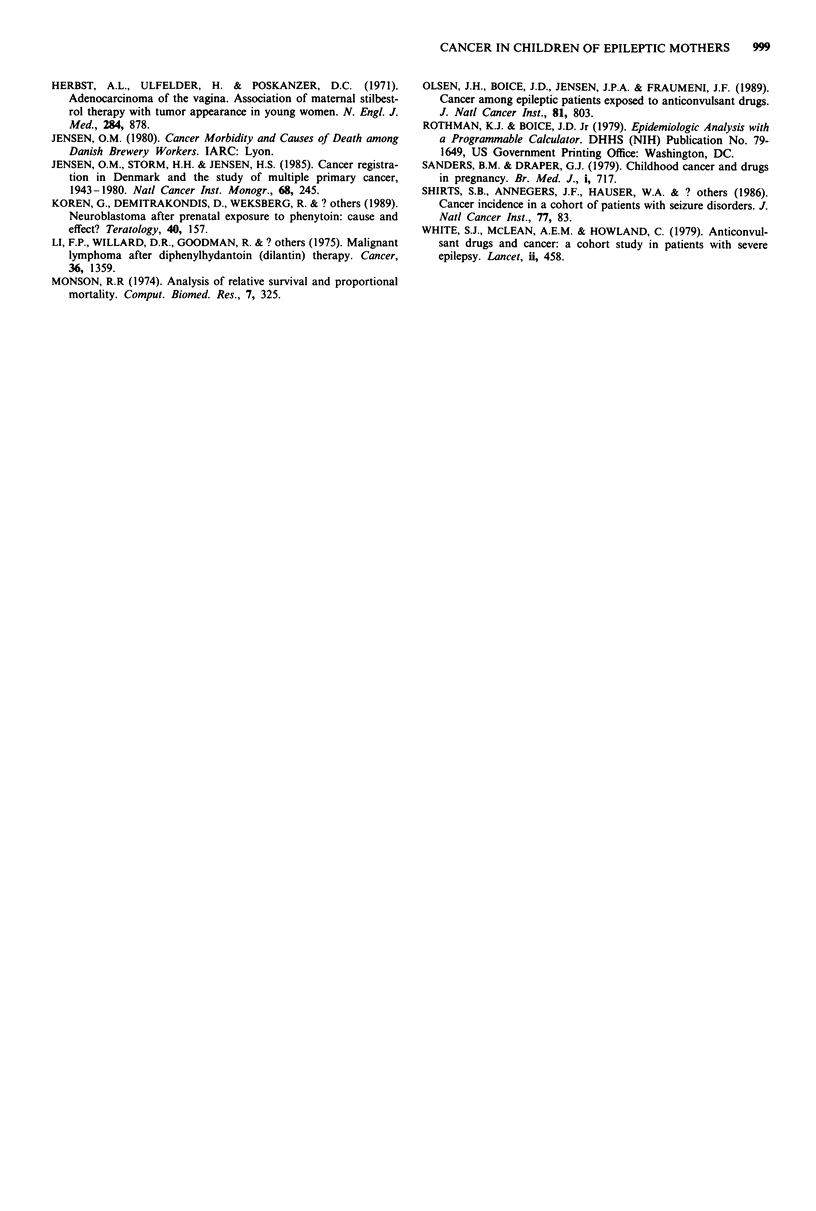Abstract
Cancer incidence among 3,727 offspring of women hospitalised for epilepsy in Denmark between 1933 and 1962 was evaluated in a record-linkage survey with the national cancer registry. The children were identified from hospital charts, population listings, and parish registries. For all children (born before and after their mothers' hospitalisation), no excess of cancer was found in comparison with the general population (49 observed vs 53.8 expected). Among the 2,579 children born after their mothers' first admission for epilepsy, and thus presumably exposed in utero to anticonvulsant drugs, 14 cancers were identified compared to 13.8 expected (relative risk 1.0; 95% confidence interval 0.6-1.7). Contrary to some previous reports, cancers of the brain and nervous system were not significantly increased (3 observed vs 2.2 expected). These data provide no evidence that anticonvulsant drugs are transplacental carcinogens, and indicate that overall increases in risk as high as 80% are unlikely.
Full text
PDF



Selected References
These references are in PubMed. This may not be the complete list of references from this article.
- Annegers J. F., Kurland L. T., Hauser W. A. Brain tumors in children exposed to barbiturates. J Natl Cancer Inst. 1979 Jul;63(1):3–3. [PubMed] [Google Scholar]
- Clemmesen J., Fuglsang-Frederiksen V., Plum C. M. Are anticonvulsants oncogenic? Lancet. 1974 Apr 20;1(7860):705–707. doi: 10.1016/s0140-6736(74)92906-7. [DOI] [PubMed] [Google Scholar]
- Clemmesen J., Hjalgrim-Jensen S. Is phenobarbital carcinogenic? A follow-up of 8078 epileptics. Ecotoxicol Environ Saf. 1978 Mar;1(4):457–470. doi: 10.1016/0147-6513(78)90014-3. [DOI] [PubMed] [Google Scholar]
- Ewertz M., Duffy S. W. Risk of breast cancer in relation to reproductive factors in Denmark. Br J Cancer. 1988 Jul;58(1):99–104. doi: 10.1038/bjc.1988.172. [DOI] [PMC free article] [PubMed] [Google Scholar]
- Ewertz M., Jensen O. M. Trends in the incidence of cancer of the corpus uteri in Denmark, 1943-1980. Am J Epidemiol. 1984 May;119(5):725–732. doi: 10.1093/oxfordjournals.aje.a113793. [DOI] [PubMed] [Google Scholar]
- Friedman G. D. Barbiturates and lung cancer in humans. J Natl Cancer Inst. 1981 Aug;67(2):291–295. [PubMed] [Google Scholar]
- Gilman E. A., Wilson L. M., Kneale G. W., Waterhouse J. A. Childhood cancers and their association with pregnancy drugs and illnesses. Paediatr Perinat Epidemiol. 1989 Jan;3(1):66–94. doi: 10.1111/j.1365-3016.1989.tb00371.x. [DOI] [PubMed] [Google Scholar]
- Gold E. B., Gordis L., Tonascia J. A., Szklo M. Brain tumors in children exposed to barbiturates. J Natl Cancer Inst. 1979 Jul;63(1):3–4. [PubMed] [Google Scholar]
- Gold E., Gordis L., Tonascia J., Szklo M. Increased risk of brain tumors in children exposed to barbiturates. J Natl Cancer Inst. 1978 Oct;61(4):1031–1034. [PubMed] [Google Scholar]
- Goldhaber M. K., Selby J. V., Hiatt R. A., Quesenberry C. P. Exposure to barbiturates in utero and during childhood risk of intracranial and spinal cord tumors. Cancer Res. 1990 Aug 1;50(15):4600–4603. [PubMed] [Google Scholar]
- Herbst A. L., Ulfelder H., Poskanzer D. C. Adenocarcinoma of the vagina. Association of maternal stilbestrol therapy with tumor appearance in young women. N Engl J Med. 1971 Apr 15;284(15):878–881. doi: 10.1056/NEJM197104222841604. [DOI] [PubMed] [Google Scholar]
- Jensen O. M., Storm H. H., Jensen H. S. Cancer registration in Denmark and the study of multiple primary cancers, 1943-80. Natl Cancer Inst Monogr. 1985 Dec;68:245–251. [PubMed] [Google Scholar]
- Koren G., Demitrakoudis D., Weksberg R., Rieder M., Shear N. H., Sonely M., Shandling B., Spielberg S. P. Neuroblastoma after prenatal exposure to phenytoin: cause and effect? Teratology. 1989 Aug;40(2):157–162. doi: 10.1002/tera.1420400209. [DOI] [PubMed] [Google Scholar]
- Li F. P., Willard D. R., Goodman R., Vawter G. Malignant lymphoma after diphenylhydantoin (dilantin) therapy. Cancer. 1975 Oct;36(4):1359–1362. doi: 10.1002/1097-0142(197510)36:4<1359::aid-cncr2820360426>3.0.co;2-l. [DOI] [PubMed] [Google Scholar]
- Monson R. R. Analysis of relative survival and proportional mortality. Comput Biomed Res. 1974 Aug;7(4):325–332. doi: 10.1016/0010-4809(74)90010-x. [DOI] [PubMed] [Google Scholar]
- Olsen J. H., Boice J. D., Jr, Jensen J. P., Fraumeni J. F., Jr Cancer among epileptic patients exposed to anticonvulsant drugs. J Natl Cancer Inst. 1989 May 10;81(10):803–808. doi: 10.1093/jnci/81.10.803. [DOI] [PubMed] [Google Scholar]
- Sanders B. M., Draper G. J. Childhood cancer and drugs in pregnancy. Br Med J. 1979 Mar 17;1(6165):717–718. doi: 10.1136/bmj.1.6165.717. [DOI] [PMC free article] [PubMed] [Google Scholar]
- White S. J., McLean A. E., Howland C. Anticonvulsant drugs and cancer. A cohort study in patients with severe epilepsy. Lancet. 1979 Sep 1;2(8140):458–461. doi: 10.1016/s0140-6736(79)91505-8. [DOI] [PubMed] [Google Scholar]


